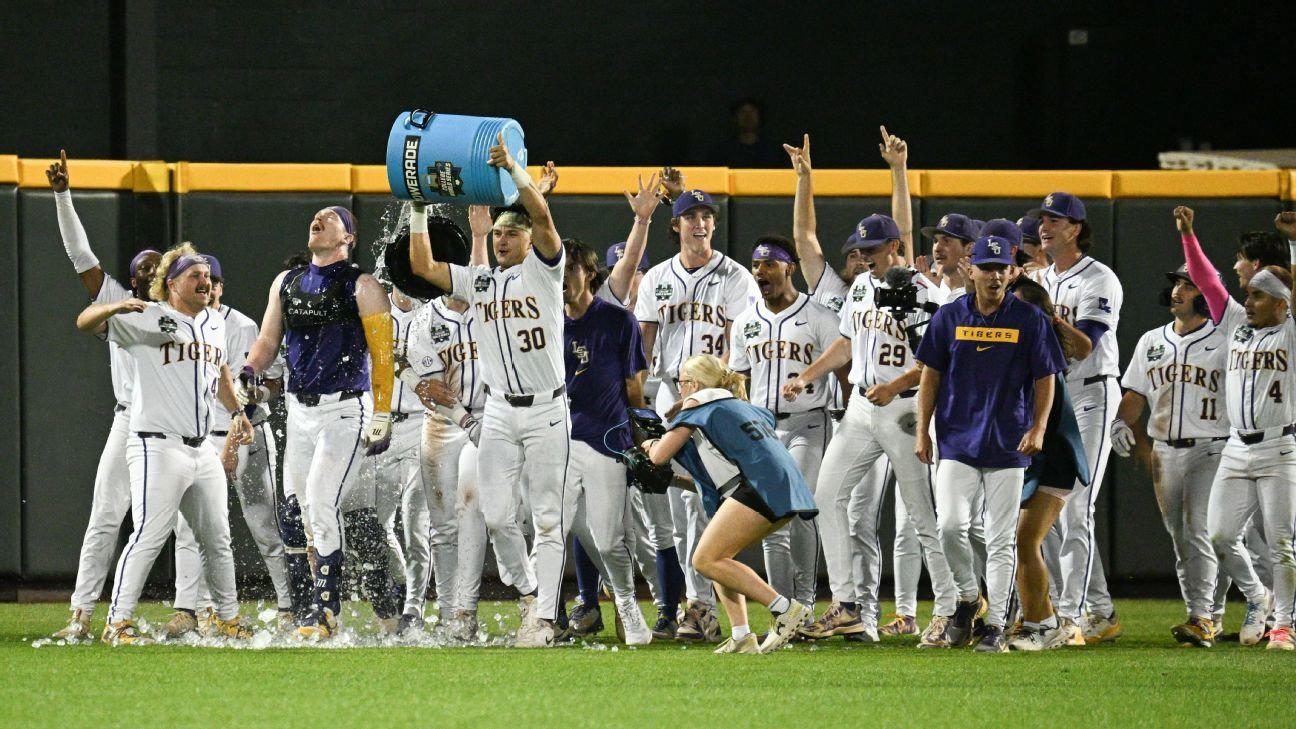OMAHA, Neb. — There are some — OK, many — who will eagerly frame this weekend’s Men’s College World Series best-of-three championship series between Coastal Carolina and LSU (beginning Saturday at 7 p.m. ET on ESPN) as a classic small guy vs. big guy showdown. The upstart vs. the establishment. The Rebel Alliance making a trench run to try to take down the Death Star.
Those who choose to take us down that line of storytelling aren’t wrong.
LSU, the purple and gold perpetual Mardi Gras of college baseball, is back in Omaha for its 20th appearance and is a seven-time MCWS champion. This is the program of Skip Bertman, Ben McDonald, Todd Walker and Paul Skenes. If the Tigers win their eighth title, all earned since 1991 with the most recent in 2023, they will bolster their argument as the greatest college baseball program ever. They are the flagship university brand of their state and a member of the all-powerful SEC, with an athletic department budget in the neighborhood of $200 million.
Coastal Carolina, the teal-draped baseball boys of South Carolina’s Grand Strand, is experiencing its second-ever trip to Omaha. The only other visit was in 2016, when the Chanticleers (the fanciest rooster imaginable, as first described to us by Chaucer, seriously), won the national title and won over the hearts of the millions who watched them beat Arizona. If the Chants (pronounced “Shonts”) win a second title in less than a decade, they will bolster their argument as a legit baseball superpower. They are, at best, the third-most-popular sports brand in their state and a member of the SBC, the Sun Belt Conference, the non-Power 4 league that wraps itself around the SEC’s corner of the map like a kudzu vine. Their last reported annual athletic department budget came in at a shade over $45 million.
But those who know these two programs best and know the men who lead those programs also know that this matchup and the roads these teams and coaches took to get here aren’t nearly as Robin Hood against the king as most might justifiably assume.
“We both still have to recruit, and we both still have to hit the transfer portal,” explained Kevin Schnall, in his first year as chief Chant. In 1999 he was the school’s first All-American. For most of the past two decades he served as an assistant coach at his alma mater, becoming nationally known as a dogged recruiter. “We both still try and find not just good baseball players, but good baseball players who fit what we are doing, who can walk into the locker room and go to work the way we go to work. That’s hard to do. But we’re both pretty good at it.”
“When I started coaching in this sport, I studied the coaches who built the greatest programs, how they did it and we might be able to learn from that,” explained Jay Johnson, who is in his fourth season leading the Tigers. Prior to that, he was head coach at Arizona for six seasons. His first year in Tucson, the Wildcats made it to the Men’s College World Series finals. They lost to Coastal Carolina. “Two of the men that I really, really deeply studied were Skip Bertman and Gary Gilmore.”
It was Gilmore, aka “Gilly,” who conjured up the Coastal Carolina program from a pile of sand, and did it quite literally. The story was told often during his team’s title run in 2016 and recalled one year ago when he was forced to step away from a hall of fame career because of an ongoing cancer fight, handing over his clipboard to Schnall. In 1995, Gilmore was called home to what is also his alma mater to help squeeze some sort of success out of a school in Conway, South Carolina, that was still widely considered a spinoff satellite campus of the University of South Carolina, the state’s anchor university. (See: The reason they are the Chanticleers is because it’s a much fancier cousin of a Gamecock.) His office was in a FEMA trailer located next to a ballpark that was little more than a stack of secondhand aluminum high school grandstands. The task was so tall he nearly quit to take a job as an elementary school PE teacher. Thankfully, he stayed, and over three decades he methodically constructed a perennial college baseball winner that went from simply being happy to make the NCAA postseason to hosting postseason games to ultimately winning it all.
“I have the greatest respect for Gary Gilmore and what he has done,” Bertman said during Coastal’s run in 2016. “I love it because I understand it. And I understand it because I lived it.”
Actually, he lived it twice. In 1962, the University of Miami was on the cusp of shuttering its baseball program when administrators decided to take one more swing, hiring a quirky part-time coach whom one of those administrators had seen on the TV game show “What’s My Line?” because he had coached the Dutch national team to a European Baseball Championship title. The field was a gravel pit, he had to beg to borrow uniforms from an Army friend (you could still see the “A” and “Y” on either side of the “Miami”) and he soaked his bucket of overused baseballs in milk each night to make them look white. A decade later, after finally persuading his bosses to give him a little money to hire a coaching staff, he called on a Miami alum and local high school baseball coach, Bertman. Together, they transformed Hurricanes baseball into a promotional family fun machine that was equal parts minor league baseball, street carnival and Chuck E. Cheese. Soon, the Canes became MCWS regulars, and then champs in 1982 and 1985.
When LSU decided it wanted in on the Omaha party, it hired Bertman away from Coral Gables just after that first Canes title.
“It wasn’t as bad as what Ron had inherited in Miami, but it was close,” Bertman recalled one year ago. “Alex Box Stadium was spacious but empty, and they had been to the postseason one time ever. So we made the place a destination — somewhere that fans would want to be, and somewhere that every kid in Louisiana who had ever picked up a baseball would want to play.”
Bertman’s teams won five MCWS titles, and The Box became the new model for how to do college hardball business, emulated in every corner of what has become a baseball-bonkers SEC … and in the northeastern corner of South Carolina.
“If you know your history of this sport, then it gives you hope when you are building something,” Gilmore explained last year as he prepared to step down. “There were so many people, people that I know wanted us to succeed, who looked at us over here grinding away on the edge of Conway, S.C., and were like, ‘Why does this crazy coach and his people over there keep talking about making it to Omaha, why do they think they can actually do this?’ I knew we could because so many of the teams I watched on ESPN who were in Omaha, they had to build their deal from nothing, too. So why not us?”
Among those inspired by what was happening on the outskirts of Myrtle Beach was Johnson. During Friday’s pre-championship news conference, Johnson was quick to remind the room that before he was charged with coaching at Arizona and LSU, he spent two years at Nevada, seven seasons as an assistant at San Diego, and that earlier he played and coached at Point Loma Nazarene, an NCAA Division II squad known as the Sea Lions.
“I know what it’s like to try to build one of those,” Johnson said. “And when you knock off that Power 5 team, how that lifts you in the regular season — not only in the postseason — and the attitude that you have to carry to be that, to do that.”
So it should come as no surprise that over the years Johnson and Schnall have become friends. It’s a relationship that began when they were both on the recruiting grind as assistant coaches of programs that shared the common bond of a constant construction mode, seeking to build foundations that might turn into Omaha launching pads.
Just as it should not be a shock that on Saturday night when the supposed David and the theoretical Goliath square off downright evenly, they will do it by playing two very classic, but divergent, styles of baseball.
LSU plays big, strong and burly both at the plate and on the mound, befitting the powerhouse it is.
Coastal, on the other side to this coin, plays very much like those early Bertman LSU squads, who preached “hold the rope” with the goal of aggressively posting runs early and then defending that lead no matter what it took over the next eight innings.
“Everything we have done, not just this season, but in all the years leading up to now, the goal was to be right here this weekend as one of the last two teams left playing baseball,” Schnall added, his voice cracking just a tad when asked about the moment of standing on a national championship diamond still wearing the uniform of the school that gave him a chance to play ball so many years ago. “But now we are here. And LSU’s goal will be the same as our goal. Hit it, pitch it, score more runs than the other guy. I’m ready to go.”
#MCWS #championship #preview #LSU #Coastal #Carolina



